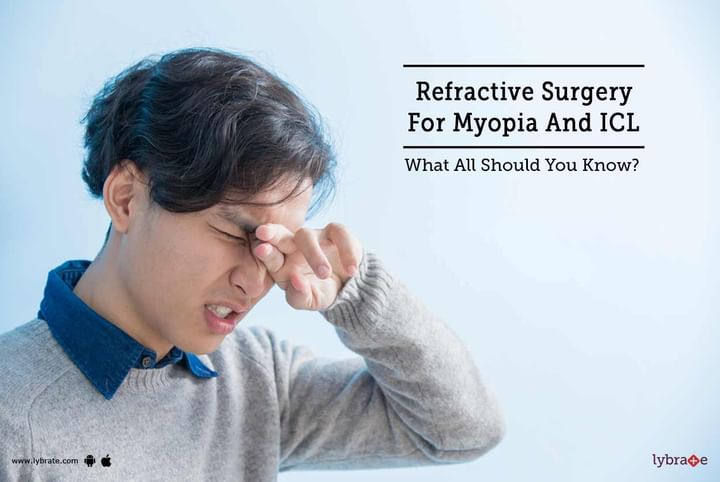Refractive Surgery For Myopia And ICL - What All Should You Know?
Myopia is a refractive defect in vision, which mainly occurs when light does not focus on the retina of the eye. Myopia, also called shortsightedness is the condition where distant objects look obscure or are blurred. This is because light is focused in front of the retina rather than onto it, which causes blurring of the distant objects.
American Optometric Association estimates that almost 30% of people suffer from myopia globally.
Causes-
- Children are diagnosed with myopia usually between 8 to 12 years of age. During this phase, a child experiences a growth spurt, and the body undergoes several changes. The eyes are no exception to this rule as the shape of the eyes change too. However, in some children this change can manifest as eye problems like myopia.
- In Adults, myopia is a secondary problem caused by primary problems like diabetes.
- Constantly staring at a computer/mobile screen at a stretch can tire out your visual apparatus. Once this happens, the eyes will try to adjust and consequently, myopia occurs.
- Genetic predisposition
Refractive Surgery-
Refractive surgery is an effective method, used for correcting your vision. There are various surgical procedures meant for adjusting the eye's focusing capability. This is done by altering the shape of the cornea (the transparent layer forming the front of the eye), or clearing the front portion of your eye. Another procedure includes embedding a lens inside your eye. LASIK (laser-assisted in situ keratomileusis) is a widely performed surgery used to reshape the cornea of the eyes. Other procedures include Photorefractive keratectomy (PRK), Laser-assisted sub epithelial keratomileusis (LASEK) and Epithelial laser-assisted in situ keratomileusis (Epi-LASIK).
This is further divided into two main procedures-
- Surface Treatment where the skin on the surface of the cornea is removed and then the laser is applied on the surface of the stroma. The laser corrects myopia and modifies the shape of the cornea.
- Flap treatment also called laser-assisted in situ keratomileusis (LASIK), employs a blade or a special laser in order to cut a thin flap on the surface of the cornea, which is then peeled backwards, and the laser is applied on the body of the cornea. At the end, the flap is replaced.
While suffering from myopia, the images are focused in front of the retina due to a longer eye or steeper corneal curve. After surgery, the images are pushed directly onto the retina or closer.
Complications-
- Scarring
- Infections
- Overcorrected or undercorrected vision
- Loss of the corneal flap or the need of a corneal graft
Benefits of the Surgery-
Refractive surgery is a good option for the patients because-
- It reduces the dependence on glasses or contact lens
- They do not cause any eye disease
- Offers a safe and stable refractive eyesight
Post-Operative Care-
A comprehensive eye evaluation is to be done to evaluate the physiological and anatomic condition of the eye. The doctor also prescribes certain eye drops that should be routinely applied.
Implantable Contact Lens-
The ICL (Implantable Contact Lens) is a ‘refractive error solution’ for those who wish to remove power for high quality vision correction. It is also used to correct the widest range of myopia.
ICL is a soft contact lens implanted into the eye through a small incision. The procedure takes only 5-10 minutes. Since it is like a permanent fixture of the eye, there is no need to remove it frequently, unlike any normal contact lens, which requires a lot of maintenance.
Advantages-
- It is less painful and needs no hospital stays
- Provides good quality and sharp vision
- Can be easily removed or replaced
- It is invisible from the outside
- Recovery and healing is faster
Implanted in over thousands of people worldwide, the amazing improvement in vision quality after using ICL has proved its capability over the last 15 years. Some people also consider ICL as an alternative to LASIK because the ICL takes refractive surgery beyond the limits of LASIK. Hence, the ICL is not just an alternative; it is a good choice for superior quality of vision.



+1.svg)
